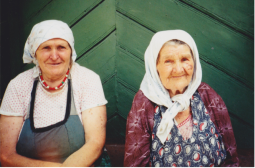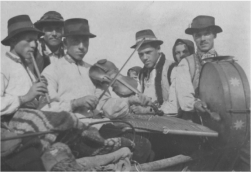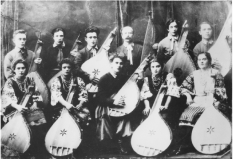—What was your parents’ farmstead like?
Maria Vasylivna: A cow, a calf, up to ten sheep, and two piglets. One would be slaughtered for meat, and the other—sold for various needs. We also had hens; my mother used to say that we didn’t need many. Not more than ten. We had three hectares of land. We were never hungry, and we always had milk, lard, honey, eggs, and apples.
………………………………………………………………………………………...
—What did your parents do besides farming?
Maria Vasylivna: My mother used to spin yarn, not for sale, just for us: to make a kilim or what we call riadno (a blanket from coarse wool), bags, and cloth for shirts. I didn’t like those rough shirts and couldn’t wear them. They could never talk me into wearing one because it was so hard on the shoulders. They would buy a thin fabric especially for me and sew a shirt out of it.
—Describe how one would work on the loom.
Maria Vasylivna: My mother didn’t weave any patterns. Other women in the village did; they took commissions. My father’s sister was mute and used to weave such beautiful kilims. My mother used to make what we called batochka (a regional word for a textile, unknown meaning). The cloth was very nice and thin. I still have it. We embroidered that cloth.
—Did you make your own clothes?
Maria Vasylivna: When we had the sheep, we would shear them, spin yarn, and make cloth. We didn’t have a fullery in our village; you would have to go to Mahliv or Berezivka. People used to sew overcoats (hunky, kozhukhy).
—Did you make the overcoats at home?
Maria Vasylivna: No, you had to take them to Antonivka where my husband was from. They made kozhukhy there. In our village, people made hunky. There was a man named Oleksa—I forget his last name—in Kalytynka. He was a very good tailor.
………………………………………………………………………………………..
—Did your parents go to the market fair?
Maria Vasylivna: The main market fair was in Dzhuryn five kilometers away from us; my parents used to go there in the horse cart. We always had strong, beautiful horses; my father loved horses very much. One stallion bit off my father’s ear and spat it out in the field. My father picked it up and went to the hospital the following day. He was told he had to come right away to get the ear stitched back. The horses were strong, and they lasted up until collectivization. Then one of them died, and we started joining other people who owned horses to work together.
—Did your parents sell anything at the market fair?
Maria Vasylivna: Apples and honey.
—Did you go to the market to buy, sell, or exchange something?
Maria Vasylivna: To buy and sell.
—Were apples rare at the time?
Maria Vasylivna: Yes, there were no apples in the village at the time. Other people’s children used to climb into our garden, and Maksym had to chase them away. My mother would sell apples, garlic, and nuts; we had a lot of nuts.
—How were the apples sold, by kilograms? What were the prices?
Maria Vasylivna: No, by bunches of ten apples. I don’t remember the prices because I left home early.
………………………………………………………………………………………..
—Did your family have any servants or day laborers?
Maria Vasylivna: Never. We didn’t need them. We only had three hectares of land. This was not enough. We worked the land on our own.
—Were there khaziaii in the village who hired day laborers?
Maria Vasylivna: Almost none. Everyone worked by themselves. Perhaps there were rich people who hired others before my time.
………………………………………………………………………………………..
—What did your mother do?
Maria Vasylivna: She helped my father in the field and was mainly doing the housework. She would get up around four o’clock in the morning to make food while all of us were still asleep. We would lock the cooked food in a barn to keep it away from the cats. When we woke up in the morning, my mother and father were already gone. We would run to the barn and eat the food.
—What did children do?
Maria Vasylivna: My responsibility was to clean, sweep the floor, and feed the chickens, piglets, and sheep. And the boys: your father was still a child and was just running around, but Maksym was already helping around [Maria Vasylivna is being interviewed by her daughter].
—Who was considered the head of the family?
Maria Vasylivna: They lived in great harmony and did everything together. Of course, a woman was always in charge.
—Who got to keep the family money?
Maria Vasylivna: They made all the decisions together, but my father was in charge of the money.
………………………………………………………………………………………..
—How did relations change within the family after it lost its homestead during collectivization?
Maria Vasylivna: My father joined the kolhosp late, around 1935. He didn’t want to join for a long time, and the other people followed his example and didn’t want to join either. Not far from here used to live another seredniak, Kornii Klipka. He was summoned to the staff office at night, “Why aren’t you joining the kolhosp?” He said, “If Vasyl Palahniuk joins, I will join.” My father used to argue with him, “Am I telling you what to do?”
………………………………………………………………………………………..
—Did everyone join the kolhosp in your village?
Maria Vasylivna: The poor people did it because they had poor tools. They may have had more land, but they weren’t able to work it. There were also ill people or those with many children, and since the authorities promised a good life, they joined out of conviction. Seredniaky were holding on, and one could say that they joined because of the pressure.
………………………………………………………………………………………..
—What kind of people carried out collectivization?
Maria Vasylivna: The cruel ones.
—Did they denounce other people?
Maria Vasylivna: They forced people. They had a gun and came at night. I remember one activist from Rozhnativka (not our village) by the name of Kryvoruchek. The people there had an uprising against a kolhsop, and he jumped out of the window. There were no uprisings in our village. We had—how shall I put it—our local activists, the paupers: Shelestian Ratushniak was the head of the village council; he conducted the evictions, and he was cruel. Another member of the village council was Yukhym Stepanovych Vasylenko from Kalytynka; he was cruel, too. I remember he summoned Motryna when I was working at the village council and started harassing her. I was working in the same room with him and made a face when I heard how he spoke to her. He said to me, “Why did you make that face? Should she be pitied? She’s a viper. She should be hanged.” She didn’t want to join the kolhosp and had a nice house.
………………………………………………………………………………………..
Maria Vasylivna: Motryna was thrown out of her house and her children were dragged out by their hands. My mother said, “Run to the barn. They dug gold into the ground somewhere there.” True, they had gold; these were the NEP years, and wheat was sold for gold, but we never had gold; I never saw any. I forgot to tell you: my father worked in the cooperative and used to bring these golden coins, and I used to sort the coins by ten karbovantsi; those were coins, but we didn’t have any actual gold. Frosia said that when this representative went with her and when she dug out the gold, he put it into his pocket.
………………………………………………………………………………………..
—Could you talk about the repressions? Were people deported?
Maria Vasylivna: Yes, the kurkuli were deported during collectivization. Filimon Slobodianiuk from Kalytynka was deported, and Motryna [likely a close relative] was thrown out of the house. Hryhir, the father of Todosii Rudy, was also deported. Taras Dorozhovy was deported as well as our relative Ivanko Konovalchuk, y’know, the father of Aunt Paraska. Who else? There were seven khaziaii.
—Was any one of them deported with their family?
Maria Vasylivna: The families were thrown out of the houses, but only the men (“khaziaii”) were exiled: Hryhir Rudy and Filimon Slobodianiuk. They didn’t touch Konovalchuk, just those two.
—Was your father deported later?
Maria Vasylivna: Yes.
—Did the people who were deported come back?
Maria Vasylivna: Slobodianiuk didn’t come back; he only wrote a letter—not even he himself, but his friend did. They were somewhere; I can’t remember where. That man sent a letter here but didn’t say that Slobodianiuk had died. Hryhir Rudy came back worn out, emaciated. He said he worked as a guard there and prayed day and night for his children to survive. He came back infirm, too weak; he was not more than twenty-nine when he was repressed, so young. He came back after ten years and said he nearly died of famine but was spared; there were good people there, too. He was given a job as a guard somewhere and he survived because he was young, twenty-nine. . .
………………………………………………………………………………………..
—Who conducted collectivization?
Maria Vasylivna: There were local activists, but they didn’t campaign strongly. Other activists were sent from Vinnytsia and Sharhorod.
—Do you remember these people?
Maria Vasylivna: Yes. The head of the village council in Dzhuuryn was a Jew named Sheivekhman. He was a communist. He was an activist.
—Were these the Twenty-Five Thousanders?
Maria Vasylivna: It might have been them. Back in the day, I didn’t understand this very well.
—How did they look?
Maria Vasylivna: There was even one Bielorussian. He came to our house, and Maksym was playing outside. He asked him, “Little man, where’s your bat¢ko (Father)?” Maksym said to him, “Hold on, I’ll go ask my tato (Dad). He’s in the garden.” The boy didn’t know the word [bat’ko] that the Bielorussian used. I don’t remember this man’s last name.
………………………………………………………………………………………..
—Who conducted collectivization?
Maria Vasylivna: Komsomol activists and local activists. I remember Onufrii Prokopovych Chymyrys. What did they do? They forced others to go around searching for bread.
—Who forced them?
Maria Vasylivna: Who? The head of the village council and the non-local activists. They would come and say, “Go around the village and search for grain.” They took metal rods and went around. People reminded Nykyfor Poberezhnyk of his deeds. We didn’t have the horrors of the famine. But I remember a small boy Panteleimon Kravchuk born in 1928. He was four or five at the time. His father had hidden some wheat in a bag and told him to sit on the bag if the activist brigade came. The brigade consisted of Komsomol activists and nezamozhnyky [the poor]. You understand, the thing is the poor envied the rich. This feeling of envy created the repressions and what have you. They couldn’t stand that someone was living better than they were. They lived better because they were naturally more capable. Some people say these capacities are from God, simply. They saw that some people had clothes, shoes, and food, and out of envy they reported these people. So, when they came to search Kravchuk’s house, the little boy said, “My dad said not to tell anyone that I’m sitting on a bag.” So, they took it. Such were these activists. Then Ratushniak, the head of the village council, fled to Cheliabinsk [in the Russian Ural Mountains—Ed.] before the war and met our Maksym there.
—He ran away with his family?
Maria Vasylivna: Everyone fled. The Palamarchuks lived in their house.
—Were they afraid?
Maria Vasylivna: Of course.
………………………………………………………………………………………..
—What happened to your orchard after the 1930s?
Maria Vasylivna: Nothing, we didn’t cut it; we kept it because we’d always have fresh apples in the winter. When the children came to sing carols, we’d give them nuts and apples. We would eat those apples all winter long. We didn’t sell them as much as we ate them for vitamins or give them to people as treats and gifts.
—Were there any orchard taxes?
Maria Vasylivna: No, none.
………………………………………………………………………………………..
—Who gave orders to the people who conducted the dispossessions?
Maria Vasylivna: The head of the village council and his representatives, who else? They would come and say, “Go around the village searching for grain.” They took metal rods and went searching.
………………………………………………………………………………………..
—How did the status of a woman change after the Soviet government was established?
Maria Vasylivna: Nothing has changed in peasant families.
—Tell us about the rights and obligations of a village woman: the young, the older, and the elderly.
Maria Vasylivna: Girls would work in the kolhosp starting at age ten or twelve. They watered the vegetable gardens. The older girls had a required work quota to do in the sugar beet fields. The women would sheave in the fields.
………………………………………………………………………………………..
—How many days did a wedding last?
Maria Vasylivna: In the 1930s with the Holodomor and more poverty, it would still start on a Saturday. It would take place on Saturday and Sunday, and on Monday they would take the bride to the groom’s home. Three days.
—Was there music during all three days?
Maria Vasylivna: There was no music on Saturday. The muzykanty would come on Sunday and stay on Monday because the custom was to take the bride to the groom’s home.
—What kind of music was there at the time?
Maria Vasylivna: Wind instruments. The first ensemble was with Petia Husonka.
—Do you remember the olden musical instuments?
Maria Vasylivna: Yes, when Aunt Nastia was getting married, there was a fiddle and tsymbaly.
—Was this considered the music for the poor?
Maria Vasylivna: There was no other music at the time.
—Where were the musicians hired from?
Maria Vasylivna: I don’t know. My grandfather played tsymbaly, and the old men who are now in charge of amateur performances [in the club] used to play sopilka [in their youth]. There was no harmonia, just tsymbaly and sopilka [sic].
………………………………………………………………………………………..
—What about Russian ditties (chastushky)?
Maria Vasylivna:
Oh, thank Stalin for selling Ukraine.
Oh, thank Lenin that I no longer bake bread.
Ask Stalin so you don’t have to heat the house.
—How did these ditties appear in the village?
Maria Vasylivna: They were common in Russia, and in our villages, people read them in the magazines.
Don’t try to woo me and don’t treat me with nuts,
Your land and your love are not right.
—Did you sing these ditties in Russian or Ukrainian?
Maria Vasylivna: In Russian for the most part.
………………………………………………………………………………………..
—Did the authorities forbid the old customs?
Maria Vasylivna: For example, they didn’t say anything about St. Andrew’s Day [December 13] because it was a folk holiday. But baptisms and carols were [forbidden]… The tradition of posivannia was acceptable. For baptism, people were summoned to school and questioned. Yustyna Petrivna would gather them, “Did you go to baptize anyone? Did you go caroling? Who sent you there?” She would start moralizing. I didn’t do this. During the occupation, my first-graders would bring a holiday dinner to my house. I didn’t tell them not to go caroling; I was just silent.



